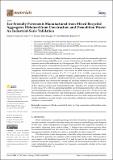Por favor, use este identificador para citar o enlazar a este item:
http://hdl.handle.net/10261/341569COMPARTIR / EXPORTAR:
 SHARE SHARE
 CORE
BASE CORE
BASE
|
|
| Visualizar otros formatos: MARC | Dublin Core | RDF | ORE | MODS | METS | DIDL | DATACITE | |

| Título: | Eco-Friendly Pavements Manufactured from Mixed Recycled Aggregates Obtained from Construction and Demolition Waste: An Industrial-Scale Validation |
Autor: | Contreras, Manuel; Gázquez, Manuel Jesús; Romero, Maximina CSIC ORCID | Palabras clave: | Concrete paver blocks Concrete kerb units Recycling Construction and demolition waste Recycled aggregates |
Fecha de publicación: | dic-2023 | Editor: | Multidisciplinary Digital Publishing Institute | Citación: | Materials 16(24): 7544 (2023) | Resumen: | This study aimed to validate that laboratory-scale results could be commercially replicated when manufacturing marketable precast concrete. Construction and demolition waste (CDW) was separated into two (fine and coarse) recycled aggregates (RAs). Precast paver and kerb units were fabricated by partial or total substitution of natural aggregates (NAs) by RAs. The study involved the comprehensive characterisation of raw materials, including particle size distribution, mineral composition, and elemental composition. Paver blocks and kerbs manufactured with up to 50% RAs showed mechanical resistance (T = 3.7 ± 0.2 and B = 5.3 ± 0.6 MPa, respectively), water absorption between 5.3–5.7%, and abrasion resistance (approximately 20.2 mm), which met the standard requirements (UNE-EN 1340:2004 and UNE-EN 1338:2004). Furthermore, industrial-scale precast pavement units demonstrated strength and durability suitable for heavy traffic areas. A reduction of 13% in cement content could maintain the requirements with a partial RA substitution of 25%, offering economic and environmental benefits. Therefore, it is feasible at an industrial level to replace NAs with RAs, promoting durability and technological properties with a positive environmental impact and considerably reducing CO2 emissions by up to 65%. Overall, pavers with RAs manufactured at the laboratory scale met mechanical standards, and the kerb stones showed improvements in abrasion resistance. On an industrial scale, kerb stones and precast blocks with specific substitutions can meet strength, water absorption, and abrasion requirements, allowing a reduction in cement content. | Versión del editor: | https://doi.org/10.3390/ma16247544 | URI: | http://hdl.handle.net/10261/341569 | DOI: | 10.3390/ma16247544 | E-ISSN: | 1996-1944 |
| Aparece en las colecciones: | (IETCC) Artículos |
Ficheros en este ítem:
| Fichero | Descripción | Tamaño | Formato | |
|---|---|---|---|---|
| Eco-Friendly_Contreras_Art_2023.pdf | 4,23 MB | Adobe PDF |  Visualizar/Abrir |
CORE Recommender
SCOPUSTM
Citations
1
checked on 21-abr-2024
Page view(s)
20
checked on 02-may-2024
Download(s)
17
checked on 02-may-2024
Google ScholarTM
Check
Altmetric
Altmetric
Este item está licenciado bajo una Licencia Creative Commons

